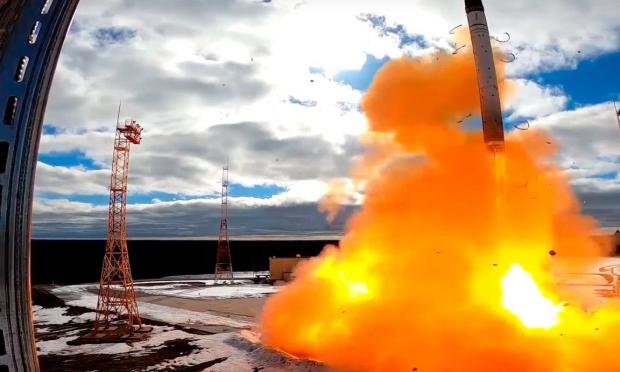According to CNN, while President Joe Biden was in Ukraine on Monday, Moscow tested an intercontinental ballistic missile, which appears to have failed.
US officials told the US network on Tuesday that Russia notified the US in advance of the missile test. According to the officials, the US did not see the test as an escalation.
It is a Russian SARMAT intercontinental ballistic missile, named Satan II by NATO, and described as a "supership" by the head of Russia's aerospace research service.
US officials believe the test failed after Russian President Vladimir Putin did not mention it in his State of the Nation address on Tuesday. During his speech, Putin announced that Russia would suspend its participation in the New START nuclear arms reduction treaty with the United States.
US officials informed the Kremlin on Sunday, via the two nations' de-escalation line, that Biden would make the trip to the Ukrainian capital ahead of the one-year anniversary of Russia's invasion of the former Soviet state, the adviser said on Monday. of national security Jake Sullivan.
The reported test launch of the missile, which is designed to carry up to 15 nuclear warheads as well as hypersonic munitions, is Putin's latest apparent attempt to make a "show of force" to the US.
"Satan II" was also mentioned in 2022 by Vladimir Putin saying that this particular missile "will be food for thought for those trying to threaten Russia".
At the time, however, Western analysts had assessed the test as an attempt by Putin to divert attention from the military failures of the Russian armed forces on the Ukrainian front, most notably the sinking of the Moskva flagship of the Black Sea fleet.
Russian challenges to US FIRs
The Russian military has suffered multiple significant battlefield defeats in Ukraine over the past year and has broadly "failed" in its strategic objectives there, multiple senior US officials have said. But Putin has shown no intention of rethinking the war, which he still insists is a "special military operation".
Last week, Russian fighters and bombers flew near Alaska twice in as many days, prompting NORAD to scramble its fighters in response. The Russian jets remained outside US and Canadian sovereign airspace, which extends 12 miles from the coastline, but flew in or near the Alaskan Air Defense Identification Zone, which is up to 200 miles from the coastline.
"We remain ready to use any means to defend North America"
Two NORAD F-16s intercepted TU-95 bombers and SU-35 fighters that had already entered the ADIZ last Monday. A day later, NORAD F-35s intercepted TU-95 bombers, as well as SU-30 and SU-35 fighters.
"We remain prepared to use a range of response options to defend North American and Arctic sovereignty," NORAD said in a statement.
NORAD stressed that it does not view the Russian flights as provocative or threatening, nor does it consider them related to the aerial objects recently seen around Alaska and Canada.



